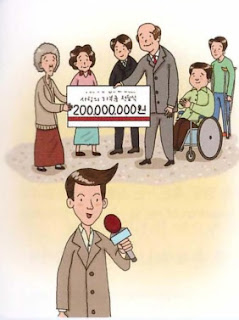가: 한 할머니가 채소를 팔아 번 돈 2억을 장애우 보육시설에 전달을 해서 화제가 되고 있다면서요?
가: I hear there’s a grandmother who’s making headlines for earning 2 billion won from selling vegetables and giving them to a nursery facility for disabled children.
나: 네, 김말봉 할머니 역시 장애를 가진 아들이 있었는데 10년 전에 세상을 떠났다고 합니다. 김 할머니는 그 아들을 키우는 데 어려움이 많았기 때문에 장애우들을 돕고 싶었다고 합니다.
나: Yes, apparently the grandmother, Mrs. Kim Malbong, had a disabled son who passed away 10 years ago. She says that she had a lot of difficulty raising her son, so she wanted to help other disabled children.
가: 특별히 김 할머니의 후원금은 예술적 재능을 가진 장애우들을 후원하는 데 사용될 거라지요?
가: And in particular, isn’t it true that the donation Mrs. Kim gave will be used to help disabled children with artistic talents?
나: 네, 그렇습니다. 평소 예술에 관심이 많았던 김 할머니는 예술에 소질이 있지만 여러 가지 한계로 재능을 발휘하기 힘들었던 장애우들을 위해 후원금을 써 달라고 부탁을 했다고 합니다.
나: Yes, that’s correct. Mrs. Kim, who is very fond of the arts herself, asked for the donation to be used to help those children with artistic talents who were prevented from showing those talents due to their disabilities.
는 데 is used to indicate the meanings of -는 일,-는 것,-는 경우, and -는 상황. It is mainly used together with the phrases 도움이 되다, 효과가 있다/없다, 좋다/나쁘다, 필요하다, 몰두하다, 최선을 다하다, 사용하 다, 걸리다, 들다, etc. It is only used with verbs, and the particle 에 can also be added to form -는 데에.
• 이 책은 아프리카의 문화와 역사를 이해하는 데 좋은 길잡이가 될 것이다.
This book should be a good guide for understanding the culture and history of Africa.
• 이번에 뽑힌 시장은 한국의 전통 시장을 되살리는 데 최선을 다하겠다고 밝혔다.
The newly elected mayor announced that she would do her best to revive Korea’s traditional markets.
• 최근 자전거 타기가 성인병을 치료하고 예방하는 데에 도움이 된다고 하여 자전거를 타는 사람들이 늘고 있다.
Recently, the number of people riding bicycles has been increasing because it is said that riding a bicycle can help treat and prevent adult diseases.
This expression is very similar to -는데 in form, but the two expressions have the following differences in meaning.

>> Full of ‘Korean grammar in use – Advanced’: Click here
>> Follow my page to get Korean lessons: Say Hi Korean

